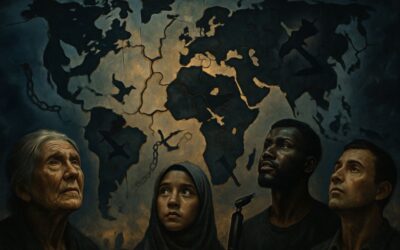History loves its victors. Julius Caesar is renowned; his conquest of Gaul a tale of tactical brilliance and Roman might. Yet, in 52 BC, a bloody siege called Alesia stands as a somber testament to the true ugliness of war, proving that even decisive victories come at a terrible price.
Clash of Leaders
Picture this: on one side, thousands of Gallic warriors, led by the charismatic Vercingetorix, trapped inside their hilltop fortress. On the other, Caesar’s vast Roman legions slowly surrounding them, determined to crush the last unified resistance to Roman rule.
Vercingetorix was no barbaric foe. He was a skilled leader, unifying tribes against a common enemy. But, Caesar was a military genius, and the walls and trenches he ordered built at Alesia transformed the battleground into a deadly cage.
Starvation and Suffering
Alesia wasn’t just soldiers clashing. Thousands of civilians were trapped. As supplies dwindled, desperation spread. Starving women and children were cast out of the fortress by Vercingetorix, hoping to appeal to Caesar’s mercy. Instead, they were coldly left to die in the space between the two armies.
Bloody Victory, Emptier Peace
Finally, starved and facing reinforcements attacking from outside, Vercingetorix surrendered. It was a crushing Gallic defeat. It paved the way for Roman domination over a vast territory and added to Caesar’s reputation. But think of the silenced voices: the countless slain warriors, the civilians driven from their homes, the legacy of bitterness and sorrow sewn for generations to come.
Futility Beyond This Ancient Battlefield
Sadly, Alesia isn’t unique. History spills over with Pyrrhic victories – those claiming triumph at such a cost that they feel closer to defeat. World War I’s ravaged battlefields offer a gruesome modern case – ‘winners’ and ‘losers’ all paid an unspeakable price in lives and humanity.
Why Alesia Still Matters
It’s tempting to view stories like Alesia as distant history. Yet, we live in a world rife with conflict. It’s vital to remember that in war, true triumph is rarely attainable. There are wounds no conquest can heal, losses deeper than any territory gain.
Action Point
When you study history, consider it through the lens of those who never make it into the tales of heroes. When discussing current events, question the ‘victory’ narrative. Is the cost just? Alesia reminds us that the loudest voice isn’t always the most important, and war leaves scars far deeper than any victor’s monument.
Let’s strive for a world where Alesia’s echoes fade, and conflict gives way to a more enduring form of peace.
Why Should You Care?
- History Isn’t Abstract: Battles like Alesia impact real people with hopes, fears, and suffering often obscured by the focus on ‘great leaders’ and strategy.
- Challenge The Victor’s Narrative: “Winning” comes at a cost. It’s vital to critically examine glorified conflicts and ask, at what price?
- Consequences Outlast Battles: War leaves not just physical scars, but generational trauma, division, and resentment that long outlive the fighting.
- The Urgency of Peace: This kind of history should make us uncomfortable. It drives home the crucial need to value diplomacy and work toward conflict resolution far before reaching battlefield standoffs.
Key Takeaways
- War always brings extreme suffering, with civilians bearing a massive, under-told burden.
- “Victory” doesn’t equal ‘justice’ or erase the brutality and lasting damages of conflict.
- History is rife with battles where costs ultimately negate strategic success.
- Caesar, while held up as brilliant, oversaw actions which would be war crimes by modern standards.
- It’s essential to understand the futility of war as a starting point for building a more peaceful future.
Keywords & Definitions
- Alesia: Ancient fortified town in Gaul (modern-day France), site of a crucial siege during Caesar’s conquest.
- Gallic Wars: Conflict between Julius Caesar’s Rome and tribes across Gaul 58-50 BC.
- Caesar: Roman general, later dictator, famed for military prowess and political ambition.
- Vercingetorix: A leader who unified Gallic tribes against Roman invasion, eventually defeated at Alesia.
- Civilian Casualties: Non-combatants who suffer death, injury, or loss as a result of war.
- Siege: Surrounding and blockading a location by a hostile force to make it surrender.
- Futility of War: Idea that wars, regardless of the “winning” side, generally bring a net-negative for humanity.
- Pyrrhic Victory: A win obtained at such massive cost that it feels closer to a defeat.
- War Crimes: Actions violating laws governing conflict, such as intentional harming of civilians.
- Diplomacy: Peaceful negotiation and conflict resolution between states or groups.
Frequently Asked Questions
- Were Gauls barbaric as Romans depict? No! They had complex society, metalworking, etc. Roman propaganda painted them as savages to justify warfare.
- Did Vercingetorix survive? Sadly, no. He was held captive for years as a ‘trophy’ in Caesar’s triumph, then executed, a common Roman cruelty.
- Are other sieges similar? Unfortunately, yes. Starvation tactics are brutal, even recently (ex: Siege of Sarajevo in the 1990s).
Myth Buster
- Myth: Ancient warfare wasn’t ‘that’ horrifying.
- Reality: Battles lacked precision; indiscriminate killing of civilians was rampant. Alesia wasn’t exceptional, but illustrates the standard cruelty.
Let’s Talk!
- Does knowing Caesar’s victories came at such a human cost alter your perception of him?
- Can conflict ever be completely justified? Or is diplomacy always the wiser option?
- Do we, in modern times, adequately memorialize the ‘losers’ of history? Why or why not?
Join the discussion in the comments below!










0 Comments